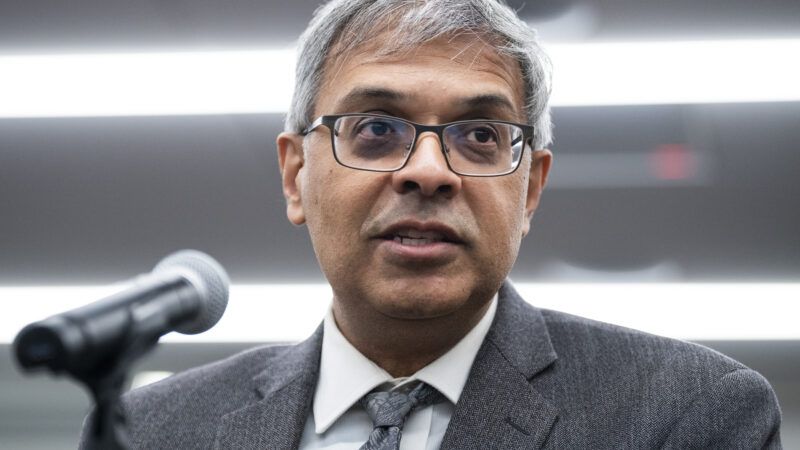Will Jay Bhattacharya Get Gain-of-Function Research Under Control?
The past three administrations have tried and failed to implement binding regulations on risky research that likely caused the COVID-19 pandemic.

In a party-line vote last evening, the U.S. Senate confirmed Stanford professor and medical researcher Jay Bhattacharya as director of the National Institutes of Health (NIH).
The confirmation of Bhattacharya—an early, prominent skeptic of COVID-era lockdowns and mandates—comes at a pivotal time for the NIH and its oversight of risky pandemic research.
There's been a growing mainstream acceptance that the COVID-19 pandemic did in fact start in a Chinese lab as a result of risky gain-of-function research funded by the NIH. That's fanned concerns that a future pandemic could start in a similar fashion should this kind of research not be brought under tighter control.
In the coming weeks, a new Biden administration-crafted regulatory framework intended to strengthen oversight of federal funding for risky pandemic research is scheduled to go into effect.
The White House is also reportedly planning to issue a more sweeping ban on federal funding of gain-of-function research, which Bhattacharya (as head of the agency that funds the vast majority of this research) would be largely responsible for enforcing.
Both the Obama administration and the first Trump administration tried to either pause or place some guardrails around federal funding of gain-of-function research. Yet both administration's regulations depended on NIH leadership to flag which experiments they considered dangerous enough to be worth pausing or subjecting to additional scrutiny.
During that time, NIH leadership—namely former Director Francis Collins and Anthony Fauci—were strong proponents of such research and critics of subjecting its federal funding to additional scrutiny.
In May 2024, the Biden administration issued a new regulatory framework that clarified when research funding agencies like the NIH needed to forward research proposals involving the enhancement of potential pandemic-causing pathogens up the chain for independent department-level risk-benefit review.
That framework is supposed to go into effect on May 6. But back in January, the White House paused implementation of any pending regulations from the last administration, which include its pandemic research regulations.
The new regulations will thus remain stalled unless, and until, the White House decides otherwise.
So long as they are stalled, the current gain-of-function regulations (which were crafted by the Obama administration and implemented under the first Trump administration in 2017) will remain in effect.
Also in January, The Wall Street Journal reported that the Trump administration was preparing to issue a pause on gain-of-function research.
In Congress, Sen. Rand Paul (R–Ky.) has re-introduced a bill that would create an independent Life Sciences Research Security Board within the executive branch, whose approval would be required to fund "high-risk life sciences" research.
When Paul's bill passed out of committee during the last Congress, Bhattacharya praised it as a "great step forward toward the goal of protecting the American people from scientists conducting the kinds of dangerous experiments that likely led to the covid pandemic."
A White House pause on gain-of-function research would allow time for Paul's bill to pass and its new independent board to be set up. With Bhattacharya's confirmation, he expects such a ban to be issued imminently.
In recent weeks, Fauci and Collins have come under renewed, mainstream scrutiny for suppressing the early debate about whether its funding of risky pandemic research in Wuhan, China, could have caused the pandemic.
Richard Ebright, a molecular biologist at Rutgers University and arch-critic of gain-of-function research, argues that the change in personnel at NIH is just as important as any change in the executive regulations on gain-of-function research.
"The difference is if you have an NIH director who has a serious interest in this subject and wishes to reflect the public interest rather than his own interest and the interest of a very small set of high-risk researchers," he says.
